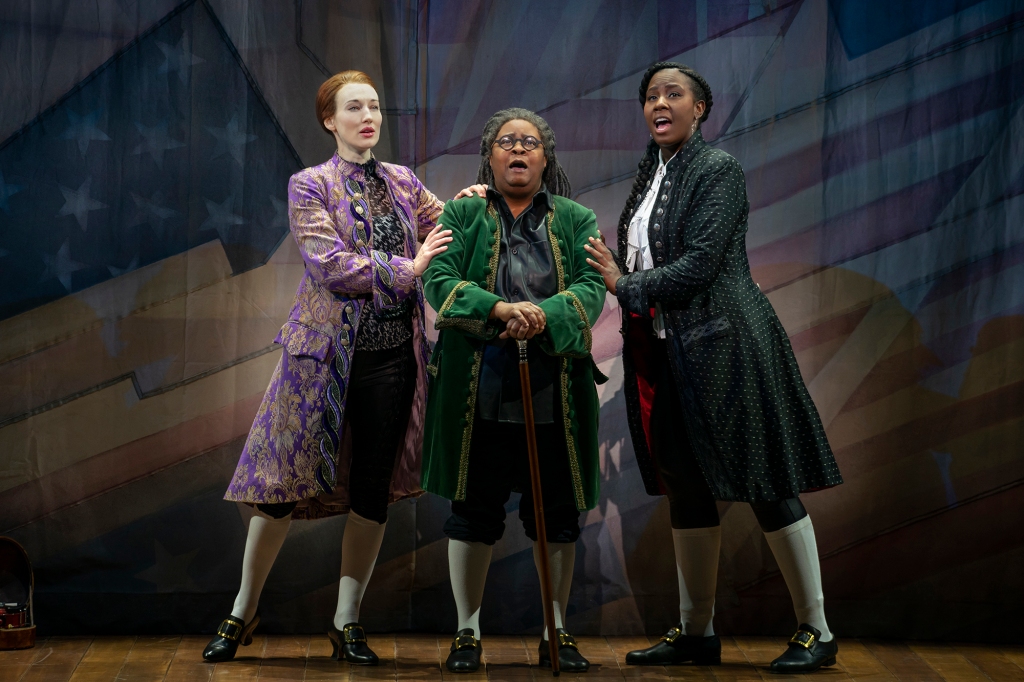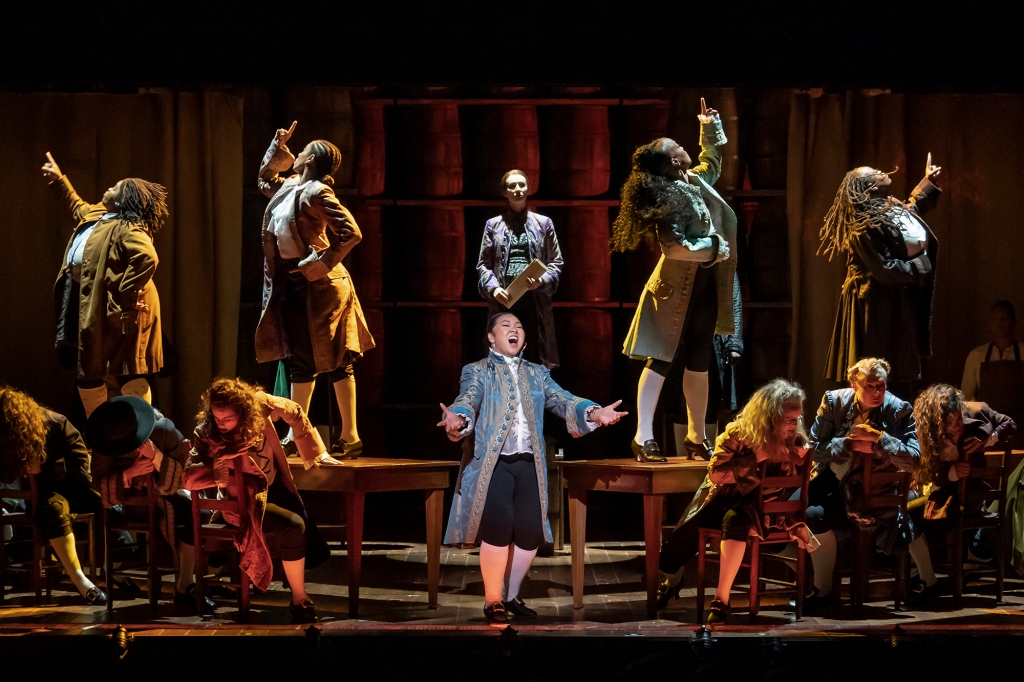‘1776’ Broadway review: Woke musical isn’t revolutionary
The script, or book, of the 1969 musical “1776” is a truly remarkable creation.
By Peter Stone, it’s witty, suspenseful, nuanced and confronts the complex issues involved in the founding of the United States like an addictive TV drama would. “1776,” as written, is not the Disney’s Hall of Presidents the uninitiated imagine it to be, but an electrifyingly human, theatrical experience. Well, it should be anyway.
Stone’s book is also, as evidenced by the frustrating new revival of the show that opened Thursday night on Broadway, absolutely ironclad — and able to stand up to pointless, auteurist, burdensome, woke concepts like the one on display at the American Airlines Theatre.
Two hours and 40 minutes with one intermission. At the American Airlines Theatre, 227 W. 42nd Street.
The writer’s jokes and taut scenes still play, but only barely.
Co-directors Diane Paulus and Jeffrey L. Page have taken “1776,” which won the Tony Award for Best Musical over “Hair,” and cast women, transgender and nonbinary actors as the Founding Fathers. That’s a fine idea for a whole new show with a different angle. Lin-Manuel Miranda’s “Hamilton,” of course, brilliantly reframed Alexander Hamilton, George Washington and others as people of color, with rap as their lingua franca, in part to make the point that Hamilton and Co. were immigrants.
“1776,” however, is an old show — a proudly straightforward musical that should caper about the stage until hard-hitting issues like slavery enter in Act 2 — and heavy-handed revisionism does not suit it. Instead, the story is bogged down by cartoony, dishonest impressions of dudes and lame attempts to jam in additional meaning by giving condescending glances to the audience.
Not every directorial decision has to have logic, but Paulus and Page’s casting stunt is not powerfully evocative either, other than contributing a “take that, you classic musical!” ‘tude. Yet it needlessly harms the core aspects of the show at every turn.
“1776” imagines the Second Continental Congress in Philadelphia as ornery Bostonian John Adams (Crystal Lucas-Perry, not commanding enough) attempts to convince his fellow delegates to debate and pursue independence from dastardly Great Britain. Early on, the show bops along like a sophisticated buddy comedy with Adams, Franklin (Patrena Murray) and Jefferson (Elizabeth A. Davis) convincing men to join their plight, and then gets serious as they decide whether or not to address slavery in the Declaration.
The tale is perked up by Sherman Edwards’ sprightly score, which has been mangled beyond recognition here. He wrote sublime music for tenors, baritones and basses. The number “Cool, Cool Considerate Men,” sung by staunch conservatives, should blow you out of your seat. So should “Sit Down, John,” in which irritated, overheated delegates try to get Adams to shut his trap. And “The Egg,” crooned by our leading trio as their Declaration draft is being read aloud for the first time, is one of the most rousing tunes in all musical theater. Fight me.

None of them soar here. The awful orchestrations by John Clancy warp the propulsive, 18th-century soundscape into formless, loud, contemporary pop, sung mostly by sopranos and altos who are an awkward fit performing them. There are no intentional places for singers to belt in “1776,” but this reworking aspires to be Katy Perry’s worst album.
The entire evening, Edwards’ score is skewered.
Videos of important events in recent American history are projected during “The Egg,” because apparently the music isn’t thrilling enough on its own.
The somber war protest song “Momma Look Sharp” is exploded into a full-cast “One Day More.”
The only agreeable number is “He Plays the Violin,” nicely performed by Eryn LeCroy as Martha Jefferson.

What the revival amps up most is the issue of slavery, which was already tackled in the original, so it’s only reiteration.
Edward Rutledge (Sara Porkalob), the representative from South Carolina, will not agree to independence unless slavery is kept in. Adams and others vehemently disagree, and Rutledge sings “Molasses to Rum,” about how New England is just as guilty when it comes to the sin of slavery as any Southerner. That number has been, like everything else, put on steroids and the important lyrics become an afterthought to ceaseless motion. A friend turned to me when it was over and said, “That was really cool. What were they singing about?”
Reviewing the original in ‘69, Post critic Richard Watts wrote, “In this cynical age, it required courage as well as enterprise to do a musical play that simply deals with the events leading up to the signing of the Declaration of Independence … [‘1776’] makes no attempt to be satirical or wander off into modern by-paths.”
Hear, hear!
Read the full article Here


